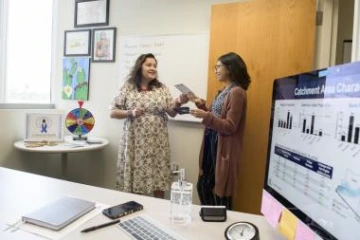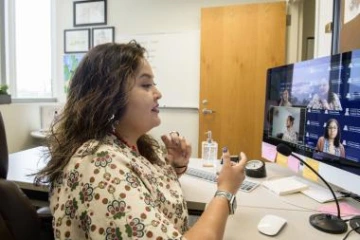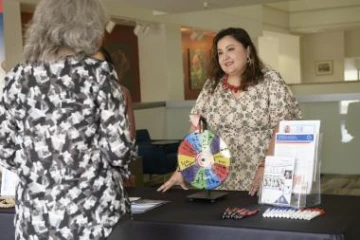Building Bridges Between Cancer Center and Tribal Communities
Dr. Monica Yellowhair unites her cancer expertise with a love for education and her community to strive for health equity and a cancer-free Arizona.

Each day is unique for Monica Yellowhair, PhD, director of outreach and tribal relations for the University of Arizona Cancer Center’s Community Outreach and Engagement (COE) program.
She might be at a community event on one day, walking adults and children through a giant inflatable colon to explain the importance of screening for colon cancer, which affects American Indians in the Southwest at higher rates than whites in the region.
Yellowhair-Community outreach_klh3116.jpgDr. Yellowhair’s research study on the genotoxic effects of uranium was one of the first selected for the Partnership for Native American Cancer Prevention (NACP), a collaboration between Northern Arizona University and the UArizona Cancer Center.

Dr. Yellowhair’s research study on the genotoxic effects of uranium was one of the first selected for the Partnership for Native American Cancer Prevention (NACP), a collaboration between Northern Arizona University and the UArizona Cancer Center.
Or, she might be organizing a town hall to engage community members, tribal health leaders, health care providers and elected officials to find ways to improve cancer prevention and care.
Other days, she might be at the UArizona Cancer Center, helping a researcher interested in addressing cancer disparities with outreach to a reservation.
“I love being out in the community and answering people’s questions,” said Dr. Yellowhair. “We need to make sure that we’re talking to various communities that have not been reached by the Cancer Center before, providing proper cancer information and spreading awareness.”
Dr. Yellowhair is uniquely suited to to build sustainable partnerships between the Cancer Center and tribal communities in Arizona. Growing up in Kayenta (Tódinéshzhee’), a small community on the Navajo reservation in northern Arizona, she always loved science.
Heeding the call to research
As an undergraduate at Northern Arizona University, Dr. Yellowhair first became interested in cancer research, studying the potential health effects of depleted uranium. She originally had planned on becoming a secondary science teacher.
“But once I got into the lab, I knew that’s where I wanted to be,” said Dr. Yellowhair.
Yellowhair-Community outreach_klh3096.jpgThe pandemic and social distancing has forced Dr. Yellowhair to be creative in her community outreach, relying on virtual events.

The pandemic and social distancing has forced Dr. Yellowhair to be creative in her community outreach, relying on virtual events.
Her research hit close to home, as more than 500 abandoned uranium mines are on the Navajo reservation. The mines processed uranium to fuel nuclear reactors and weapons during the Cold War era, long before modern mining practices were in place to minimize environmental contamination. As a child, Dr. Yellowhair heard stories about the effects of uranium on miners and their families on the reservation.
Years later, Dr. Yellowhair saw that a lot of the research looked at the radiological effects of uranium but not at the effects of depleted uranium that was still seeping out from abandoned mines. Several epidemiology reports pointed to a possible link with pancreatic and stomach cancers – types of cancers that are unrelated to ionizing radiation from uranium.
Dr. Yellowhair and her NAU mentor Diane Stearns, PhD, applied for funding to study the genotoxic effects of uranium. Their research project was one of the first selected for the Partnership for Native American Cancer Prevention (NACP), a collaboration between NAU and the Cancer Center. NACP research projects address Native American community priorities and cancer disparities, and pair an NAU mentor with one at the Cancer Center – in this case, R. Clark Lantz, PhD, professor emeritus of cellular and molecular medicine and a member of the Cancer Center’s Clinical and Translational Oncology Program.
Continuing her research as a Wildcat
After completing her bachelor’s and master’s degrees at NAU, Dr. Yellowhair moved to Tucson for her doctoral studies, continuing her research on uranium with Dr. Lantz. She was awarded a prestigious Ruth L. Kirschstein predoctoral fellowship from the National Institutes of Health to support her research on how uranium affected DNA repair and how that may contribute to cancer. Her results confirmed that depleted uranium was harmful to cells, leading to single-stranded breaks in the DNA in rodent model ovary cells, most likely by forming adducts with the DNA.
“Monica is really focused and is an adept scientist,” said Dr. Lantz. “One of the things that sets her apart is her passion for her community. So that is certainly one of driving forces for her to get the knowledge and education and to pass that on to the Navajo Nation and beyond to help improve health outcomes.”
After earning her PhD in toxicology, Dr. Yellowhair joined the Cancer Center as a postdoctoral researcher and then became an assistant research scientist. Her investigations took her to communities near and far.
She worked with Peter Lance, MD, professor emeritus of molecular and cellular biology and a member of the Cancer Center’s Cancer Prevention and Control Program, to study the effects of diet on the microbiome of people living on the Navajo reservation versus the city. As part of the work, she adapted a national food frequency questionnaire to make it more relevant to American Indian tribes.
“I enjoyed meeting different people who I probably never would have had an opportunity to meet sitting in the lab all day,” said Dr. Yellowhair. “When I presented my research to the community, I loved hearing their side of the stories and letting them know that someone like me is working for them.”
A career shift but the same ultimate goal
Dr. Yellowhair’s love of education and working in the community, combined with her knowledge of cancer, made her move to the COE team a natural fit.
Yellowhair-Community outreach_klh3151.jpgProviding information and spreading awareness about what the Cancer Center can offer underserved communities motivates Dr. Yellowhair.

Providing information and spreading awareness about what the Cancer Center can offer underserved communities motivates Dr. Yellowhair.
“Working in the Cancer Center broadened my horizons as far as translational research and understanding how environmental and lifestyle factors can greatly affect people through increased risk of cancer,” Dr. Yellowhair said. “It was a big shift going from the laboratory to working in a community, but having a background primarily in science is really a benefit. I’m able to answer a lot of the technical questions that people may have, and I can assist other Cancer Center members with outreach if they want to go out into the community and get information. I try to make sure they also get their research out to the community, which is very important.”
During the pandemic, Dr. Yellowhair and the rest of the COE team have had to be creative, such as developing virtual tours of the colon in English and Spanish and holding drive-by events. They also started the “Let’s Taco ‘Bout Cancer” series, which are informal webinars held on Tuesdays with cancer health care providers, researchers and cancer survivors, and the team created presentations to help people understand clinical trials and why they should consider signing up for one.
“We’re all trying to find the same answers and help our communities, whether it’s through cancer research or through education about how to prevent cancer,” said Dr. Yellowhair. “Helping other people is really what I love about this job.”



